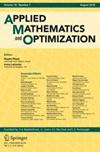Well-Posedness of 3D MHD Equations with Damping on Time-Varying Domains
IF 1.6
2区 数学
Q2 MATHEMATICS, APPLIED
引用次数: 0
Abstract
In the present paper, we consider the well-posedness of 3D MHD equations with the damping terms \(|u|^{\alpha -1}u\) and \(|B|^{\beta -1}B\) (\(\alpha ,\beta \ge 1\)) defined on time-varying domains with homogeneous Dirichlet boundary conditions. We show that the damped 3D MHD system has global weak solutions for any \(1\le \alpha ,\beta \le 5\) and the weak solution is unique for any \(4\le \alpha ,\beta \le 5\).
时变域上具有阻尼的三维多流体力学方程的良好拟合
本文考虑了具有齐次Dirichlet边界条件的时变域上定义阻尼项\(|u|^{\alpha -1}u\)和\(|B|^{\beta -1}B\) (\(\alpha ,\beta \ge 1\))的三维MHD方程的适定性。我们证明了阻尼三维MHD系统对任何\(1\le \alpha ,\beta \le 5\)都有全局弱解,并且弱解对任何\(4\le \alpha ,\beta \le 5\)都是唯一的。
本文章由计算机程序翻译,如有差异,请以英文原文为准。
求助全文
约1分钟内获得全文
求助全文
来源期刊
CiteScore
3.30
自引率
5.60%
发文量
103
审稿时长
>12 weeks
期刊介绍:
The Applied Mathematics and Optimization Journal covers a broad range of mathematical methods in particular those that bridge with optimization and have some connection with applications. Core topics include calculus of variations, partial differential equations, stochastic control, optimization of deterministic or stochastic systems in discrete or continuous time, homogenization, control theory, mean field games, dynamic games and optimal transport. Algorithmic, data analytic, machine learning and numerical methods which support the modeling and analysis of optimization problems are encouraged. Of great interest are papers which show some novel idea in either the theory or model which include some connection with potential applications in science and engineering.

 求助内容:
求助内容: 应助结果提醒方式:
应助结果提醒方式:


